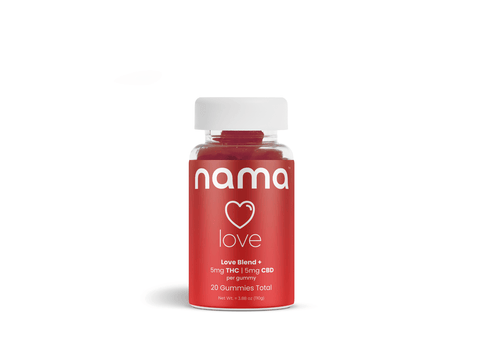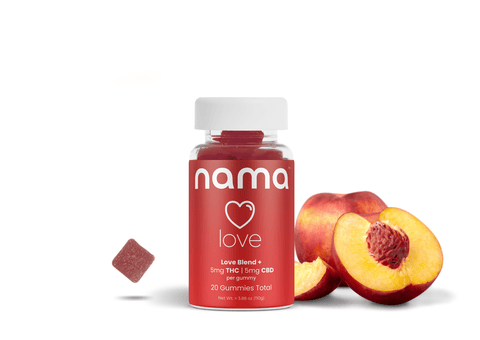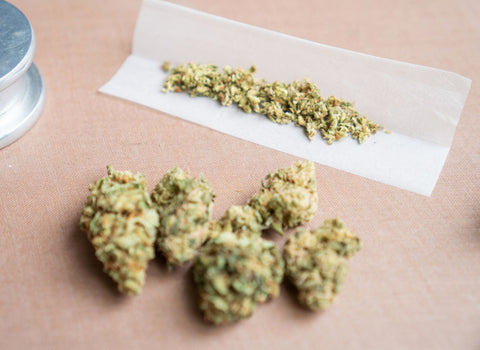
Allergy sufferers are always on the hunt for effective relief, especially when traditional antihistamines aren’t doing the trick. So what are some alternative options?
Our low-dose cannabis edibles may help reduce the symptoms of allergies.
While more scientific evidence is needed, we do know that small amounts of cannabis can reduce inflammation and boost your immune system. This supports the notion that microdosing edibles can help with allergies, which we will explore in more depth.
Order our blood orange Energy gummies (only 2.5 mg of THC per gummy) and experience the therapeutic benefits of microdosed edibles.


THC: 10 mg | CBC: 10 mg | CBD: 10 mg | CBG: 5 mg | CBN 5mg
What are cannabis edibles?
Cannabis edibles are products that contain small, precise amounts of cannabis compounds such as Delta 9 THC and CBD. All of our edibles contain between 2 and 10 mg of THC, which makes them one of the safest and most reliable methods of consuming cannabis. The 2–10 mg doses of Delta 9 in our edibles are well below the amount that typically produces psychoactive effects.
You can buy our edibles in the form of delicious gummies infused with real fruit or, if you prefer sipping on delicious non-alcoholic mocktails, try our THC drinks. Only 2.2 milligrams of THC and 2.9 milligrams of cannabidiol in our cannabis mixers provide the perfect microdose to relieve pain, alleviate stress, and boost your productivity.
Our low-dose cannabis edibles are the best way to consume cannabis. Here’s why:
- Our gummies and THC beverages deliver a precise dose of Delta 9, CBD, and other cannabis compounds, allowing you to know exactly how much you’re consuming. By sticking to recommended doses, you can avoid overconsumption.
- Smoking and vaping may still be the most popular methods of cannabis consumption, but they sure aren’t healthy. Ingesting cannabis avoids the carcinogens and lung damage associated with smoke, tar, and other toxic compounds released when cannabis flower is burnt and inhaled. This makes our edibles a much healthier and safer option.
- Speaking of safety, edibles ensure the slow release of compounds into your system. You can feel the effects of our gummies anywhere between 30 minutes and two hours after ingestion, which gives you more control over your experience.
- Our edibles contain natural flavors and ingredients. No toxins, pesticides, heavy metals, or other nonsense ingredients that can compromise your health and affect potency.
- No additives, preservatives, or artificial flavors, our gummies are 100% natural.
- You can add a drop or two of our liquid THC drops to any non-alcoholic beverage you like. Create a delicious lemonade with a kick or a THC-boosted craft mocktail.
So sip your THC mocktail or chew your favorite fruity gummy in peace. The calibrated microdoses provide just enough THC to boost your focus, relieve pain, and bring out the mellow vibes without any mental haziness getting in your way.
Our Relax Plus gummies with only 5 mg of Delta 9 give you a taste of mellow vibes without the intense high. These watermelon-flavored gummies hit the relaxation sweet spot.
Can edibles help with allergies?
Anecdotal reports suggest that microdoses of cannabis may help alleviate those problematic allergic symptoms. Evidence shows that key cannabis compounds have anti-inflammatory and immune-boosting properties (among others).
Before we examine the therapeutic potential, we need to make it clear that published research has yet to directly examine cannabis’ efficacy as an allergy treatment. In the absence of proper data, we view these reports as preliminary and urge you to discuss consumption with your healthcare provider.
Here are some ways in which microdosing cannabis may help with your allergies.
The anti-inflammatory properties of cannabis help with allergies
THC and CBD have potent anti-inflammatory properties. A 2023 study found that THC and CBD exhibit anti-inflammatory effects by reducing levels of pro-inflammatory cytokines such as IL-6, IL-8, and TNF-alpha. They interact with the body's endocannabinoid system (ECS), which regulates immune responses and inflammation. By modulating the ECS, THC and CBD can dial down the inflammatory cascade before it spirals out of control, effectively reducing allergy symptom severity.
During an allergic reaction, the immune system overreacts and triggers an inflammatory response, releasing histamines and other chemicals that cause irritating symptoms such as:
- Runny, stuffy nose
- Sneezing
- Itchy, watery eyes
- Itchy skin, hives, eczema
- Sinus pressure and congestion
- Swollen tongue or lips
THC and CBD intervene through their interactions with the ECS. They bind to the cannabinoid receptors located throughout the body, including in immune cells, and instruct them to produce fewer inflammatory signals, alleviating some of these allergy symptoms.
Cannabis regulates immune function to soothe allergic reactions
During an allergic reaction, IgE antibodies go haywire, mistakenly tagging harmless particles as threats. This triggers the release of histamine and other inflammatory chemicals. THC and CBD interact with the endocannabinoid system to fine-tune the immune response and regulate antibody and inflammation-producing immune cells.
A 2013 study found that “topical treatment of THC on DNFB-mediated allergic contact dermatitis in mice revealed that THC effectively decreased myeloid immune cell infiltration and contact allergic ear swelling.” This shows that THC may help reduce immune cell inflammation and swelling caused by an allergic skin reaction.
Through the ECS, THC and CBD prevent exaggerated immune responses while still allowing the immune system to do its job protecting against actual pathogens. With cannabis' immunomodulatory effects, the body is less prone to launch unnecessary attacks against benign allergens.
Low-dose cannabis improves sleep quality
Restful sleep is key for overall health, especially for those dealing with allergies. People with allergies often struggle with sleep for several reasons:
- Nasal congestion, sneezing, and itchy eyes can make it hard to relax and fall asleep.
- Allergies can trigger inflammation in your airways, leading to allergic asthma, which can worsen at night and disrupt your sleep.
- Anxiety and stress from dealing with allergies can also make it difficult to unwind and get a good night's sleep.
That's where low-dose cannabis comes in. Microdosing edibles can improve sleep quality by interacting with the ECS to promote a sense of calm and relaxation. While too much THC might lead to undesirable effects such as grogginess or brain fog, smaller amounts of THC can help regulate sleep cycles, reduce nighttime awakenings, and enhance the overall quality of sleep.
Whether you're battling insomnia or simply looking for a natural sleep aid, our Sleep Plus gummies will guide you gently into dreamland.
Cannabis edibles help reduce stress and improve mood
Cannabis edibles can help reduce stress and anxiety, which are factors that can worsen allergy symptoms. Microdosed edibles may effectively alleviate anxiety and enhance mood for people grappling with allergies. When consumed in edible form, cannabis compounds interact with the endocannabinoid system to promote relaxation and reduce anxious feelings. This calming effect can help people maintain a more balanced mood and prevent stress from intensifying allergic responses.
When you incorporate small, controlled amounts of cannabis into your diet, you can experience an improved mood without worrying about the adverse effects that can come with larger doses. Our strawberry Euphoria gummies contain 10 mg of THC (which is well below the psychoactive threshold) to provide a delightful mood boost.
Why are edibles better than inhaling cannabis?
Cannabis edibles, including our gummies and THC-infused drinks, are one of the healthiest ways to consume cannabis, especially for people dealing with allergies. There are so many advantages to eating your cannabis instead of smoking or vaping.
- Unlike smoking or vaping, edibles avoid harmful smoke or irritants, which can aggravate respiratory conditions and allergy-related symptoms. Our edibles eliminate the production of the toxic combustion byproducts associated with smoking, reducing potential health risks. For those with allergies or respiratory sensitivities, edibles offer a safer alternative to respiratory health while still enjoying the benefits of cannabis.
- They offer precise dosing, allowing you to control the amount of THC, CBD, and other cannabis compounds you consume. This reduces the risk of overconsumption.
- Edibles typically provide longer-lasting effects compared to inhaled methods. You get longer-lasting, more sustained symptom relief without the need for frequent dosing.
- Edibles often have a more enjoyable taste compared to the pungent flavor of smoked or vaporized cannabis. We use real, organic fruit to make our delicious gummies. (Try our Bliss gummies made with fresh melons and see for yourself.)
Can cannabis cause allergic reactions?
While relatively rare, cannabis can trigger allergic reactions in some people. These allergies can manifest as:
- Skin rashes
- Itching
- Hives
- Nasal congestion
- Sneezing
- Watery eyes
- In severe cases, anaphylaxis (a severe allergic reaction)
These allergic reactions are not typically triggered by the cannabinoids themselves, but rather by proteins found in the cannabis plant. Some of these proteins can cross-react with other allergenic substances such as certain tree or grass pollens, making people with a history of allergies or asthma more susceptible to cannabis-related allergies.
Cannabis can provoke both type 1 and type 4 allergic reactions. Officially recognized allergens include a pathogenesis-related class 10 allergen, profilin, and a nonspecific lipid transfer protein…Cannabis also has the potential to provoke allergic cross-reactions to plant foods. (Skypala, et. al.)
While cannabis-related allergies are typically associated with specific proteins rather than the dosage, lower amounts of cannabis may reduce the likelihood of experiencing an allergic reaction because they limit the presence of these allergenic proteins. Smaller doses may also reduce the severity of any allergic response if one were to occur.
You can’t go wrong with a low-dose cannabis edible, such as our Energy Delta 9 gummies. Only 2.5 milligrams of THC and 5 milligrams of CBD are just enough to lift the mood and relax the mind without the risk of negative effects and allergic reactions.
Product QUIZ
Need help deciding what product is best for you? Take our quiz, just three questions until your perfect match!
How to consume cannabis for allergies
Proper dosing is everything. We want to ensure a safe, effective cannabis experience, especially if you’re suffering from allergies. That’s why we think sticking to smaller amounts of cannabis could provide the relief you need and the experience you want without compromising your respiratory health or exacerbating your allergy symptoms.
Here are some guidelines for safely consuming cannabis if you suffer from allergies:
- Start low and go slow. Begin with a low dose, especially if you're new to it or have allergies. We recommend starting with 1-2 mg of THC and slowly working your way up. This approach minimizes the risk of adverse reactions and allows you to gauge your tolerance.
- Opt for cannabis strains that are lower in THC and higher in CBD. CBD is known for its anti-inflammatory and calming properties, which can be beneficial for allergy-related discomfort.
- Avoid smoking or vaping cannabis. This is a must as inhaling smoke or vapor can irritate the respiratory system, potentially worsening allergy symptoms. (Hint: cannabis edibles pose no risk to your respiratory health.)
- Consult a healthcare professional. Before you incorporate cannabis into your allergy management strategy, consult with a healthcare provider, especially if you have underlying medical conditions or take other medications.
- Keep your allergy medications at hand. Even though cannabis may help with some symptoms, have your prescribed allergy medications on hand in case of unexpected flare-ups.
- Pay attention to how your body reacts to cannabis. If you experience any adverse effects or heightened allergy symptoms, consider adjusting your dosage or consulting a healthcare professional.
- Stay hydrated. Cannabis can cause dry mouth (cottonmouth), so make sure you're well-hydrated by drinking plenty of water. Proper hydration can help with allergy-related dryness and congestion.
Do you know what doesn’t cause cottonmouth? A refreshing, non-alcoholic beverage enhanced with our THC Buzz drops.
Infuse your favorite drink with our low-dose cannabis infusion and steer clear of the adverse effects of booze.
Check out our collection of THC-infused mocktail recipes and enjoy a deliciously hydrating refreshment that can help soothe your allergies.
Is microdosing cannabis legal?
According to the 2018 Farm Bill, Delta 9 THC is federally legal if it is derived from hemp and if the THC content in the product does not exceed 0.3% by dry weight. The Farm Bill removed hemp and hemp derivatives from the list of controlled substances and drew a clear legal distinction between hemp and marijuana.
That makes our Delta 9 edibles legal at the federal level, including gummies with hemp-derived cannabidiol and our THC drinks.
Despite federal legality, each state individually decides on the legality of hemp-derived products. See our guide to make sure your state is Delta 9-friendly.
Microdosing edibles for allergies FAQ
Renowned for its anti-inflammatory and immunomodulatory properties, CBD holds promise as a natural remedy for managing allergic reactions and related symptoms. By modulating the immune response and reducing inflammation, CBD may alleviate some of the discomfort associated with allergies. With this being said, we are still in need of comprehensive research into CBD's beneficial effects on allergies to draw concrete conclusions.
Although CBD is not a traditional antihistamine, its anti-inflammatory properties suggest that it may serve as an immunomodulator in inflammation-related conditions, including allergies. By targeting inflammatory pathways, CBD can help regulate the immune response, potentially reducing the release of histamines and minimizing the symptoms associated with allergic reactions. Research has also shown that CBD exhibits antioxidant activity, which could further contribute to its anti-allergic effects.
Daily CBD consumption is generally considered safe and may offer various health benefits. CBD can help regulate the immune system and reduce chronic inflammation, which speaks to its viability as a daily supplement.
Consult with a healthcare professional before integrating CBD into your daily routine. Medical guidance ensures that CBD is used safely alongside other treatments, addressing individual health needs.
CBD's potent anti-inflammatory properties may offer relief for allergic asthma by reducing airway inflammation and promoting bronchodilation. It is essential to emphasize that CBD should complement prescribed asthma medications, not replace them. Consult a healthcare provider to determine the best approach for managing allergic asthma with CBD.
THC does not function as a conventional antihistamine. It does not directly target histamine receptors but may indirectly affect allergic responses by modulating the endocannabinoid system. THC exerts different effects depending on the dose you take. If you take too much THC, you may experience some psychoactive effects. When you stick to small amounts, THC produces a pleasant buzz, alongside anxiety and pain relief.
Adverse reactions to THC can include elevated heart rate, heightened anxiety, paranoia, dry mouth (cottonmouth), impaired coordination, and in some instances, hallucinations or psychosis. These effects can vary based on individual sensitivity and dosage, underscoring the importance of responsible use and proper dosing.
Edibles themselves are not directly linked to phlegm production. However, overconsumption of cannabis, whether through smoking, vaping, or edibles, can lead to throat irritation and an increase in phlegm production in some individuals. Proper hydration can help mitigate phlegm buildup.
Combining cannabis edibles with other medications warrants consultation with a healthcare professional. Interactions between cannabis and specific drugs can vary widely, potentially affecting the effectiveness of medication or causing unwanted side effects. Seek guidance from a healthcare provider to ensure safe and responsible use, and remember to consider your medical history and current medications.
The hemp plant can potentially trigger allergic reactions in some people. Allergic responses to hemp can manifest as skin allergies, respiratory symptoms, or other reactions. Be aware of potential allergic reactions when handling or consuming hemp-derived products, especially if you have a known sensitivity to allergens.
There are several approaches to managing chronic pain associated with allergic skin disease. Consulting your healthcare provider is the first and most important to address an allergic skin disease. Medicinal properties found in certain natural substances, such as the cannabis plant and medicinal mushrooms, may offer therapeutic applications in addressing allergy-related issues.
Always seek advice from healthcare providers to tailor treatment strategies to your specific needs.
Top Sellers
New? Start with our Ultimate Sampler!

THC: 10 mg | CBC: 10 mg | CBD: 10 mg | CBG: 5 mg | CBN 5mg
Resources
Zaiachuk, M., Suryavanshi, S. V., Pryimak, N., Kovalchuk, I., & Kovalchuk, O. (2022). The Anti-Inflammatory Effects of Cannabis sativa Extracts on LPS-Induced Cytokines Release in Human Macrophages. Molecules, 28(13), 4991. https://doi.org/10.3390/molecules28134991
Gaffal E, Cron M, Glodde N, Tüting T. Anti-inflammatory activity of topical THC in DNFB-mediated mouse allergic contact dermatitis independent of CB1 and CB2 receptors. Allergy. 2013 Aug;68(8):994-1000. doi: 10.1111/all.12183. Epub 2013 Jul 29. PMID: 23889474.
Skypala, I. J., Jeimy, S., Brucker, H., Nayak, A. P., Decuyper, I. I., Bernstein, J. A., Connors, L., Kanani, A., Klimek, L., Ryan Lo, S. C., Murphy, K. R., Nanda, A., Poole, J. A., Walusiak-Skorupa, J., Sussman, G., Zeiger, J. S., Goodman, R. E., Ellis, A. K., Silvers, W. S., . . . Cannabis Allergy Collaboration, T. I. (2022). Cannabis-related allergies: An international overview and consensus recommendations. Allergy, 77(7), 2038. https://doi.org/10.1111/all.15237
Atalay S, Jarocka-Karpowicz I, Skrzydlewska E. Antioxidative and Anti-Inflammatory Properties of Cannabidiol. Antioxidants (Basel). 2019 Dec 25;9(1):21. doi: 10.3390/antiox9010021. PMID: 31881765; PMCID: PMC7023045.
nama CBD FDA & legal disclaimer
Our products are not intended to diagnose, treat, cure, or prevent any disease. They are not a replacement for prescription medications and have not been evaluated by the U.S. Food and Drug Administration (FDA).
The information provided on this website does not and is not intended to, constitute legal advice or any statement of the status of any laws. Any information, content, and materials available on this site are for general informational purposes only and are not intended to be relied upon for any purpose.
Readers of this website should contact their attorney to obtain advice concerning any particular legal matter, including decisions on what products are, or are not, legal to sell, possess, or consume. No reader, user, or browser of this site should act or refrain from acting based on the information on this site without first seeking legal advice from their counsel in the relevant jurisdiction.
About
Learn
Join us on this journey

© Copyright 2026 nama Products LLC. All Rights Reserved.
†These statements have not been evaluated by the Food and Drug Administration. These products are not intended to diagnose, treat, cure or prevent any disease. All information presented here is not meant as a substitute for or alternative to information from health care practitioners. Please consult your health care professional about potential interactions or other possible complications before using any product.
††The information provided on this website does not, and is not intended to, constitute legal advice or any statements of the status of any laws. Any information, content, and materials available on this site are for general entertainment purposes only, and are not intended to be relied upon for any purpose.
nama: The only source for Buzz Drops™

By clicking ‘Yes,’ you agree to our
Terms & Conditions and Privacy Policy
123 John Doe Street
Your Town, YT 12345
Store Hours
Sun: Closed
Mon-Fri: 9:00 - 17:00
Sat: 10:00 - 13:00
What to expect at pickup
Closed
Closing at 5pm
Closing at 5pm
Closing at 5pm
Closing at 5pm
Closing at 5pm
Closing at 1pm





![Euphoria Triple Berry [10ct]](http://www.namacbd.com/cdn/shop/files/nama_euphoria_triple_berry_pouch.png?v=1715286095&width=480)
![Euphoria Triple Berry [10ct]](http://www.namacbd.com/cdn/shop/files/nama_euphoria_tripleberry_nutrition_facts.jpg?v=1715873950&width=480)


![Buzz Drops™ [THC Drink Drops]](http://www.namacbd.com/cdn/shop/files/nama_thc_buzz_drops.png?v=1711412866&width=480)
![Buzz Drops™ [THC Drink Drops]](http://www.namacbd.com/cdn/shop/files/buzz-drop-wine-comparison.png?v=1736882023&width=480)
![Buzz Packs™ [THC and CBD Powder Drink Mix]](http://www.namacbd.com/cdn/shop/files/nama_buzz_packs_thc_drink_pack_white_background.png?v=1769586244&width=480)
![Buzz Packs™ [THC and CBD Powder Drink Mix]](http://www.namacbd.com/cdn/shop/files/Buzz_Packs_Label.png?v=1769586244&width=480)
















Comments (0)
There are no comments for this article. Be the first one to leave a message!